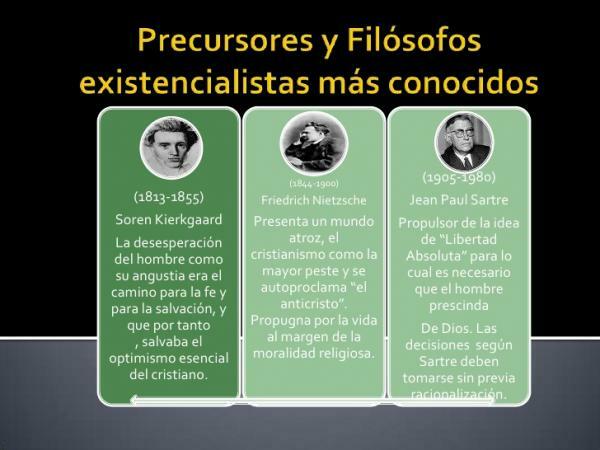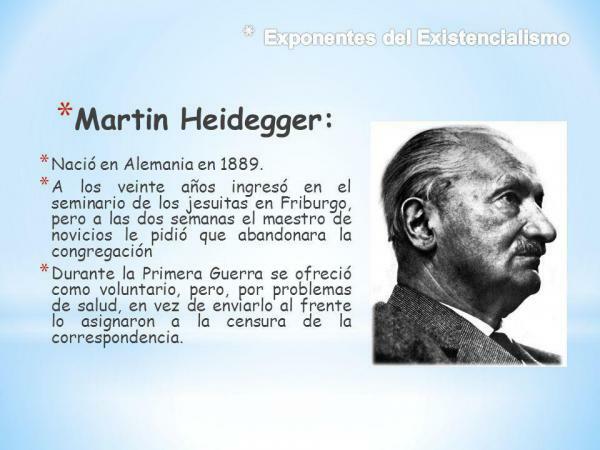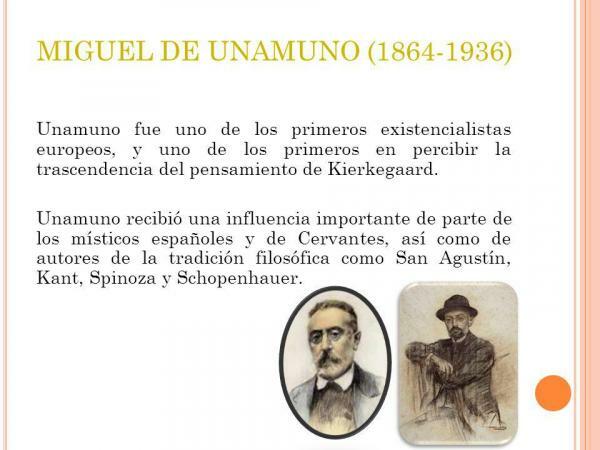Most important EXISTENTIAL philosophers

Image: Slideshare
This lesson from a TEACHER is dedicated to most important existentialist philosophers. If you want to know them, continue reading this article, it may be very interesting for you. First of all, explain that existentialism is a philosophical current that had its origin in the nineteenth century and continues until the twentieth century and is based on the idea that existence is prior to essence and, therefore, reality, precedes thought. And the same happens with the human will, which goes before its intelligence. Thus, these philosophers will focus on the study of the human being, freedom and responsibility, or the meaning of life.
Existentialism was born as a reaction to the traditional way of doing philosophy, although it does not constitute a homogeneous school that shares a common system. In this sense, I can speak of 3 schools within existentialism: Christian (Kierkegaard, Dostoevsky, Unamuno or Gabriel Marcel), agnostic (Camus or Heidegger) and atheist (J. P. Sartre) We started class!
Index
- Fyodor Dostoyevsky, an antecedent of existentialism
- Kierkegaard, fundamental in the development of existentialism
- Martin Heidegger, existentialist philosopher?
- Gabriel Marcel, the least existentialist philosopher
- Representatives of Spanish existentialism
- Jean Paul Sartre, the father of existentialism
- Simone de Beauvoir, feminist existentialism
Fyodor Dostoyevsky, an antecedent of existentialism.
Of this Russian novelist, he went so far as to say Friedrich Nietzsche: “Dostoyevsky, the only psychologist, by the way, from whom you could learn something, is one of the happiest accidents of my life ".
Dostoyevsky is considered a antecedent of existentialism due to his works, which reflect people in extreme situations, without values and who have no guide other than their conscience. The reason, affirms the novelist in his brilliant book Subsoil memories, does not serve as a guide.
“Compassion is the main law of human existence ".
Other important works areCrime and Punishment, The Demon-possessed, The Karamazov Brothers Y The idiotHe will deal with topics such as suicide, the lack of family values, salvation through suffering or the defense of Russian Orthodoxy and Tsarism against Western societies.
Kierkegaard, fundamental in the development of existentialism.
The Danish philosopher Søren Kierkegaard is one of the most important existentialist philosophers and is, in fact, considered the first existentialist philosopher in history, since he meets the necessary requirements to be one, namely, his individualism Y moral subjectivism and the heartbreak idea.
The traditional philosophy affirmed that the supreme good must be the same for all, whereas Kierkegaard defended just the opposite idea. “I must find a truth that is true for me... the idea that he can live or die for”. It is that the human being has to choose his own destiny, without the need for an objective universal law that serves as a foundation (moral individualism). Morality has no objective foundation. Only the "situated individual”Can serve as a basis for morale.
The task of philosophy, then, is not to contemplate or reveal the truth. It is not an exact science and the only truth that exists, it is the experience. Only those who act according to his own ideas can come to know the truth. Because what is truly relevant cannot be achieved through reason or through the scientific method.

Image: Slideshare
Martin Heidegger, existentialist philosopher?
The German philosopher will deny any relation to the existentialist current, and everything indicates that the attribution error could be caused by a misinterpretation ofBeing and time. The aim of the work is to recover that search for «sense of being», Which ancient philosophy would have forgotten, and that is why Heidegger makes a whole analysis of the human existence or Dasein, from the phenomenological method of Edmund husserl. Later, he abandons this analysis, and concludes, that the only answer is “thebe quiet”.
But his thought focuses on the existence of the human being, as a "being thrown", as a "being in the world." Pessimism, he characterizes all his philosophy, considering Dasein as a being thrown into existence. Human existence is an imposition, and in existing, the human being realizes his situation, he finds himself as a being in the world, and therefore, he is finite. Death is the only thing that can be expected.

Image: Slideplayer
Gabriel Marcel, the least existentialist philosopher.
The French Christian existentialist philosopher will defend in his work Metaphysical journalor, a philosophy of the concrete, that understands the human being as a being incarnated in a body, and the essence of it, what it really is, is determined by the historical moment in which it is found.
Gabriel Marcel will distinguish the "primary reflection " of the "secondary reflection". The first refers to objects and abstractions and is that of science. The second, which he himself calls his method, focuses on the plane of human existence. In this sense, both his body and the concrete historical situation will be inextricably linked to the human being, conditioning his own essence. This type of reflection is typical of philosophy, morality and religion, and in some way, leads the human being to the truth.

Image: Slideshare
Representatives of Spanish existentialism.
José Ortega y Gasset, Influenced by Husserl, he synthesizes his entire philosophy in the following sentence: I am me and my circumstance. Thus, he understands life as radical reality, as a relationship between the self and his world, as a set of experiences or Erlebnisse.
"Life is an activity that runs forward, and the present or the past is discovered later, in relation to that future. Life is futurization, it is what it is not yet”.
Miguel de Unamuno It is another of the greatest exponents of Spanish existentialism. His works reflect the tragedy and agony of life, the longing for immortality, highlighting The life of Don Quixote and Sancho, showing a Don Quixote as a representation of the desire for immortality of the Spanish people; The tragic sense of life, where the conflict between reason and faith and The agony of Christianity, which once materialized, degenerates and turns into agony.

Image: Slideplayer
Jean Paul Sartre, the father of existentialism.
We can divide the work of Sartrein three stages. A first stage in which the influence of the phenomenology of Husserl. A second stage in which he makes a defense of atheism and marks the principles of existentialism, influenced by the philosophy of Heidegger. And a third stage, in which he tries to synthesize existentialism with the Marxism.
The phrase, "Existence precedes essence" sums up all the Sartre philosophy and of the existentialist current, although it is true that it is a heterogeneous and little systematized movement.

Image: Slideshare
Simone de Beauvoir, feminist existentialism.
Simone de Beauvoir was a French writer and philosopher, a defender of human rights andfeminist, which dealt with in his work both political, social or philosophical issues. His work The second sex, u brandn milestone in the history of feminism.
He was a partner of the philosopher Jean Paul Sartre, and as for him, freedom is a fundamental concept. His ideas in this regard could be synthesized in the following sentence: Let nothing define us. Let nothing hold us down Let freedom be our own substance.
If you want to read more articles similar to Most important existentialist philosophers, we recommend that you enter our category of Philosophy.
Bibliography
Prini. P.History of Existentialism: From Kierkegaard to Today, 1992



